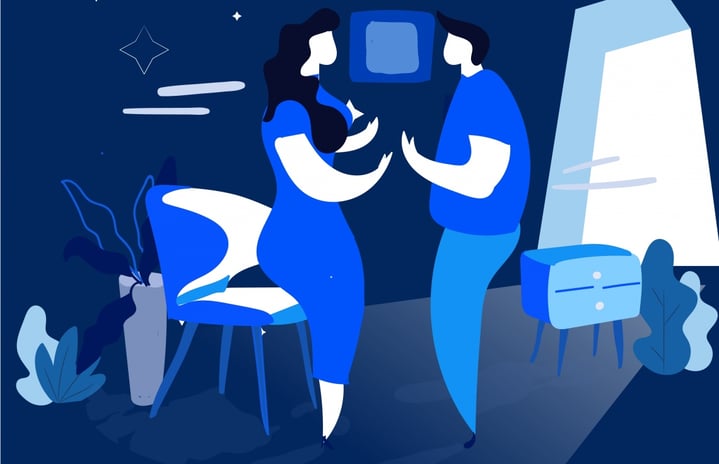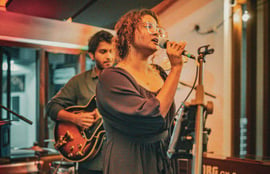Violence by any measure, or in any shape or form, is unacceptable.
By the same measure, domestic violence is no lesser form of violence - in fact, it is often the most pervasive form of violence in a society.
Take as an example the typical domestic worker, who has abusive names and xenophobic slurs casually tossed at her on a daily basis. Or the dependant wife, whose intimate photos face frequent threats of being exposed, words spoken in shaking rage, when musters courage to tell you she is filing for divorce.
It is the hands that the mother, on the brink of losing sanity, raised in her frustrations at her children - including you. The relative, who abuses the trust placed on him by advancing unwelcome attempts to touch your intimate corners, leaving you feeling unsafe and violated - for a lifetime.
These are just a few forms of domestic violence that many of us experience every day.
How could something that sounds so familiar, be considered "abuse"?
Well, broadly speaking, domestic violence is understood to be violence or any other abuse by one person against another, that takes place in a domestic setting.
Six years ago, Maldives joined the ranks of a growing number of countries that also have specific law(s) or a form of legal provision, targetting the prevention of domestic violence.
As such, The Prevention of Domestic Violence Act (2012) is a hallmark piece of legislation that sets out special procedures for redress and safeguards to protect survivors of domestic violence.
Recognising violence
Most often than not, between the sacred layers of love and trust that exist in domestic relationships (and rightly should exist in such relationships), we fail to identify abusive or controlling behaviour that harms us.
Awareness about what constitutes domestic violence is a key step in recognising violence.
Domestic violence can take many forms and under the 2012 Act, it includes, inter alia, inflicting physical, sexual, emotional or verbal abuse, harassing, threatening or stalking,
inflicting financial abuse and/or property damage, impregnating your wife against a medical doctor’s advice, impregnating a woman who wants to leave an abusive
marriage, restricting free movement of a person, in fact even detaining a person, forcing someone to do something that she would not do in her own free will and subjecting a
child to see or hear any of the above acts.
Sometimes, a form of violence may happen in isolation, however mostly, they are interconnected and is safe to say, a person who experiences one form of domestic violence also suffers from another, such as emotional abuse.
Your friend, sister or perhaps even your daughter
The now infamous “1 in 3” is a global figure, statistically derived to indicate that about 1 in 3 women experience some form of physical and/or sexual intimate partner violence in their lifetime.
Now, one may dub it "just a figure" and dismiss it at face value, perhaps understandably so if one has not gone through such an experience.
However if one can muster a modicum of empathy to look beyond our own circumstances, the following statistics may reveal the imminence and prevalence of such forms of violence, even in a community as small as ours.
Right here in Maldives, amongst women between the ages of 15 - 49 years old that had been in a relationship, 1 in 5 reported having experienced physical and/or sexual violence inflicted by an intimate partner.
Approximately 1 in 8 women of the same age group reported that they were sexually abused before the age of 15. In other words, they reported having suffered childhood sexual abuse.
The above data comes from the Maldives Study on Women’s Health and Life Experiences conducted in 2007 by the Ministry of Gender and Family and mirrors global statistics in the same regard. Remember? 1 in 3 women aged 15-49 reported experiencing at least one form of physical or sexual violence, or both, during their lifetime.
To put it simply, consider your immediate circle of loved ones, amongst the now significantly more real and worrisome “1 in 3”, must surely be your friend, sister or perhaps even your daughter.
You can become an agent of change
As someone who has been working with survivors for some time now, I have observed that today, even in the time of global movements like MeToo, many of us continue to suffer domestic violence in silence, for long periods of time.
When asked, survivors often respond by saying that they feel that they lack the support system of empathy and trust from their inner circle of family and friends, that would allow them to share their experiences.
This year, we celebrate the sixth anniversary since the 2012 Act came into effect. Six years, which I'm sure we can agree, barely amounts to a blink of an eye in the lifetime of a nation.
However it must be noted that, within these six years, the state and government institutions and civil society organisations of Maldives, have made remarkable progress in setting up and enhancing protection mechanisms on domestic violence.
As individuals, by merely becoming aware about the available protection mechanisms we can help someone who experiences domestic violence.
If I were to choose any one step as the first, it would be this: if anybody speaks to you about experiencing domestic violence, take them seriously.
Offer a listening ear, empathize without judgement and help them to report it to the Maldives Police Service (Family and Child Protection Department), Family Protection Authority or Ministry of Gender and Family.
If the person happens to reside in an island that is not Male’ City, do refer them to the family and children service centres based in every atoll or to the nearest local police station.
If the survivor fears for her own life, you can help them by reporting the case, even anonymously. If a person speaks of physical or sexual abuse, take them to see a doctor or at least encourage them to consult with one and have a medical check-up done.
If someone speaks about emotional abuse or trauma, try to direct them to the free counselling service available from the Society for Health Education (SHE).
Most importantly, if someone is in a life-threatening situation or at
imminent risk of threat and harm, report it to police and ask her to file an emergency protection order with the Family Court or the respective Magistrate Court.
In other situations, one can always file a protection order with the court. If someone needs legal advice, there is always the free legal help provided by our Family Legal Clinic, accessible even via our toll-free helpline.
All we need is a change in perspective
In order to realise a real social change in this regard, I believe the work starts within ourselves.
A helpful beginning step is to recognise domestic violence when it happens to us, as well as when it happens to others because of us or our actions.
Take for example your domestic worker, whose one little mistake or slack costs her having to listen to abusive names and xenophobic slurs. There is an alternative course of action one could take if one is willing to take responsibility for his or her own actions and identify it as a form of domestic violence. For instance, recognize and remember that she has a name and call your domestic worker by her chosen identity.
Real change follows real actions, actions that all of us are at liberty to take. Together, we can change the fate of women and girls in our country, not just on paper but by eliminating abuse for all of us, permanently.
Editor's Note: This article was originally written for “Our Shared Stories”, a publishing column run by the Family Legal Clinic. The original article addresses domestic violence suffered by both men and women. As we mark 16 Days of Activism against gender-based violence, this article has been adapted to discuss domestic violence in the context of women.




